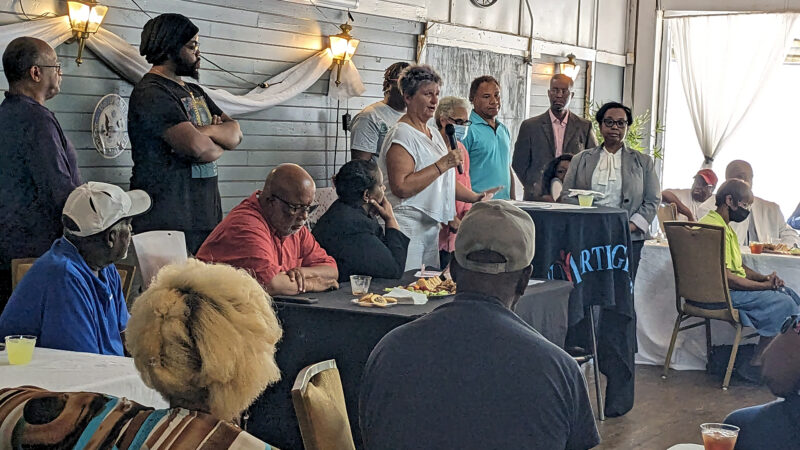Researchers look into community health impact of wood pellet production in rural Mississippi
Residents gather for a community Chat and Chew event with Mississippi’s U.S. Rep Bennie Thompson on Wednesday, August 23, 2023, in downtown Gloster, MS. Residents there gather to talk about their experiences living near the Drax wood pellet plant.
About two hours southwest of Jackson sits Gloster, Mississippi, a rural town that’s home to the Drax wood pellet plant — one of several in the Gulf South.
Often used overseas, burning wood pellets for fuel can help power energy and heating systems, and proponents of the practice say it’s cheaper than other fuel sources and low in moisture and ash content, meaning the wood pellets should burn cleanly.
But researchers from Brown University in Rhode Island and Tougaloo College in Jackson, Mississippi, are examining if these wood pellet plants are harming the health of residents in the surrounding communities.
Students from both schools spent the Spring 2024 semester measuring the lung health of 112 Gloster residents. The study was done in partnership with the Greater Greener Gloster Project, a community-based environmental justice group partially led by Krystal Martin.
The study also compared the plant’s effects on the Gloster residents to the health of residents living in Mendenhall, Mississippi, a town with similar median incomes for residents and a similar poverty rate to Gloster’s, but does not have wood pellet manufacturing nearby.
Researchers set up air pollution monitors to measure levels of volatile organic compounds, which the Environmental Protection Agency says can cause damage to the liver, kidney and central nervous system, and certain hazardous air pollutants that can increase the chance of cancer or serious health effects such as respiratory and neurological problems. Researchers also monitored the area for noise pollution.
They found that Mendenhall had less air pollution and less noise pollution than Gloster did. Erica Walker, an assistant professor of epidemiology at the Brown University School of Public Health, said the early findings are limited, and the universities plan to study Gloster long term. They still have to analyze lung capacity and blood data, for example.
“The strength of this is that we are beginning to actually put real data to the question of whether or not wood pellet manufacturing is harmful to the communities who live nearby,” Walker said. “Until this work, very little has been done in this space.”
Results were presented during a community meeting in early May. Betty Ravencraft, who lives less than a mile from the Gloster mill, said she’s seen her husband and neighbors get sick. A new study, Ravencraft believes, could help provide residents with the data they need to ask for accountability from Drax, the international company headquartered in the U.K. that owns the plant, and environmental regulators.
“Our lives are at stake,” Ravencraft said. “We’re going to keep screaming at the top of our lungs. So if you just stay with us and keep helping us, we would really appreciate it.”
Half of the people surveyed were between the ages of 40 to 60, with the rest spread out from ages 12 to 80. Participants were 96% African American and 4% Caucasian. The majority (86) were female.
Brown and Tougaloo students will return this summer to help distribute DIY air purifiers for residents to help address indoor air quality. Future research plans include having more monitoring sites, broadening which air pollutants are studied, increasing sample sizes and representations of groups with higher risks of lung impairment, and measuring more households for indoor air quality.
They are also implementing a public health survey across Mississippi to collect information on children.
“The idea is to understand how this wood pellet manufacturing is influencing the health of children that live nearby,” Walker said.
This story was produced by the Gulf States Newsroom, a collaboration between Mississippi Public Broadcasting, WBHM in Alabama, WWNO and WRKF in Louisiana and NPR.
40 years after ‘Purple Rain,’ Prince’s band remembers how the movie came together
Before social media, the film Purple Rain gave audiences a peak into Prince’s musical life. Band members say the true genesis of the title song was much less combative than the version presented in the film.
Park Fire in California could continue growing exponentially, Cal Fire officer says
Cal Fire has confirmed that over a hundred structures have been damaged in the Park Fire, which grew overnight near Chico, Calif. Difficult firefighting conditions are forecast through Friday night.
Checking in with Black voters in Georgia about the election, now that Biden is out
Some voters who could be key to deciding who wins Georgia. What do they think about Vice President Harris becoming the frontrunner in the race to be the Democratic nominee?
Tahiti’s waves are a matter of ‘life and death’ for surfing Olympics
Tahiti's Teahupo'o wave has a slew of riders for the Paris 2024 Olympics. NPR finds out why it's called one of the most dangerous waves.
Researchers are revising botanical names to address troubling connotations
Since the mid-1700s, researchers have classified life with scientific names. But some of them have problematic histories and connotations. The botanical community is trying to tackle this issue.
A spectacular opening ceremony wowed a global audience despite Paris’ on-and-off rain
The Paris Olympics opening ceremony wowed Parisians, fans and most everyone who was able to catch a glimpse of thousands of athletes floating down the Seine to officially begin the Games.



